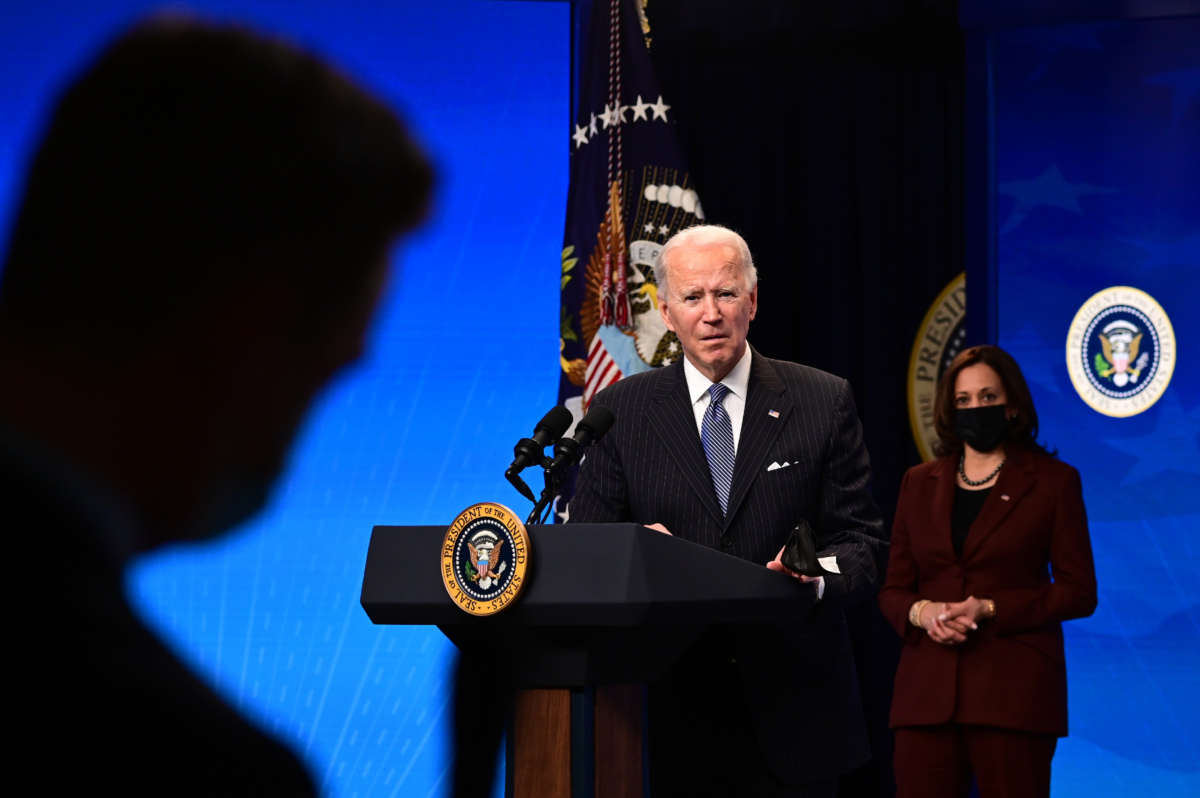Support justice-driven, accurate and transparent news — make a quick donation to Truthout today!
The push for a $15 federal minimum wage in President Joe Biden’s $1.9 trillion stimulus is dead as the proposal’s last hope has been abandoned by its main proponents.
The last best hope for the inclusion of the $15 minimum wage was a proposal by Senate Budget Chair Bernie Sanders (I-Vermont). After the budget parliamentarian ruled that the minimum wage increase couldn’t be voted on through budget reconciliation, Sanders announced a backup plan for the wage raise: implementing a tax on large corporations that didn’t pay their employees at least $15 an hour.
But, as The Washington Post reports, Sanders and Senate Finance Chair Ron Wyden (D-Oregon), who partnered with Sanders to push for the proposal, have now abandoned that idea after economists and tax experts warned that the proposed corporate tax is full of loopholes and would be difficult to implement. To skirt the tax, for instance, corporations could begin to classify their workers as contractors, they warned. And the proposal still may not raise the wages of the many minimum wage workers who don’t work for large corporations.
It would also have been difficult to incorporate the proposal into the stimulus at such a late hour since it would need to be drafted and passed around lawmakers for their consideration. Key unemployment benefits are expiring on March 14, so the bill’s passing is on a tight deadline.
Stay in the loop
Never miss the news and analysis you care about.
The House passed the current version of the stimulus on Saturday and the Senate will begin to take up consideration of it this week. If senators offer amendments to the bill, the chamber may pass a different version, which would send it back to the House for another vote. The bill, with popular provisions such as the $1,400 direct relief payments, received zero Republican votes in the House.
The failure to incorporate the $15 minimum wage into this stimulus isn’t only the fault of the complications of Sanders’s tax proposal. In fact, it was the moderate Democrats who had the power to decide whether or not to get the wage increase done soon.
Democratic senators had a couple of options to implement the minimum wage proposal even after the parliamentarian ruled against it.
As many progressives pointed out, the parliamentarian’s rule was not a binding ruling but rather a suggestion, since the parliamentarian doesn’t actually wield that sort of power. To get around it, Vice President Kamala Harris could have overruled the parliamentarian’s decision to allow a reconciliation vote on the wage increase anyway.
A coalition of progressive representatives led by Rep. Ro Khanna (D-California) sent a letter to Biden and Harris on Monday calling on Harris to overrule the parliamentarian and implement the $15 minimum wage anyway.
“This ruling is a bridge too far” in sidelining progressive goals, Khanna said in a press release about the letter. “We’ve been asked, politely but firmly, to compromise on nearly all of our principles & goals. Not this time. If we don’t overrule the Senate parliamentarian, we are condoning poverty wages for millions of Americans.” The White House said last week that Harris was not going to disregard the parliamentarian’s ruling.
But even if Harris did override the parliamentarian, however, the Democrats would still be faced with another problem: Senators Joe Manchin (D-West Virginia) and Kyrsten Sinema (D-Arizona), who have vocally opposed the wage increase. Though it’s unclear whether or not they would have voted against the stimulus outright if Harris had kept the $15 minimum wage, they still stand as a roadblock to getting the wage increase passed in other ways, like abolishing the filibuster — which they also oppose.
Because of certain Democrats’ unwillingness to buck procedure, some have argued that the blame for the current death of the $15 minimum wage falls squarely on the Democrats. “As long as Sinema and Manchin remain in opposition to it, it will be plainly and literally true that a $15 minimum wage increase is being blocked by Democrats,” writes The New Republic’s Osita Nwanevu.
Biden’s press secretary, Jen Psaki, said on Sunday that Biden’s team is currently figuring out the best way forward for the wage proposal. “We’re going to have to spend the next several days or even weeks figuring out what the best path forward is,” said Psaki, “but he’s committed to doing that.” As Nwanevu pointed out, however, Biden is also partially at fault for the axing of the $15 wage from the stimulus since he, as the leader of the party, could help to convince Democrats like Sinema and Manchin to disregard procedure.
Over the weekend, progressives expressed frustration over the current death of the $15 minimum wage, arguing that the failure to implement the proposal will lead to Democrats’ unseating in 2022.
“We can’t go back to voters in two years and say, ‘you know what, we made you a promise — you delivered us the House, the White House, and the Senate — but a parliamentarian told us that we can’t do it,’” said Rep. Pramila Jayapal (D-Washington).
Speaking against the authoritarian crackdown
In the midst of a nationwide attack on civil liberties, Truthout urgently needs your help.
Journalism is a critical tool in the fight against Trump and his extremist agenda. The right wing knows this — that’s why they’ve taken over many legacy media publications.
But we won’t let truth be replaced by propaganda. As the Trump administration works to silence dissent, please support nonprofit independent journalism. Truthout is almost entirely funded by individual giving, so a one-time or monthly donation goes a long way. Click below to sustain our work.
